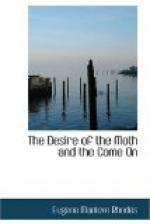The great Chihuahuan desert is a boot too; a larger boot than Italy. The leg of it is in Mexico, the toe is in Arizona, the heel in New Mexico; and the Jornado is in the boot-heel.
El Jornado del Muerto—the Journey of the Dead Man! From what dim old legend has the name come down? No one knows. The name has outlived the story.
Perhaps some grim, hard-riding Spaniard made his last ride here; weary at last of war, turned his dead face back to Spain and the pleasant valleys of his childhood. We have a glimpse of him, small in the mighty silence; his faithful few about him, with fearful backward glances; a gray sea of waving grama breaking at their feet; the great mountains looking down on them. Plymouth Rock is unnamed yet.—Then the mist shuts down.
The Santa Fe Trail reaches across the Jornado; tradition tells of vague, wild battles with Apache and Navajo; there are grave-cairns on lone dim ridges, whereon each passer casts a stone. Young mothers dreamed over the cradles of those who now sleep here, undreaming; here is the end of all dreams.
Doniphan passed this way; Kit Carson rode here; the Texans journeyed north along that old road in ’62—to return no more.
These were but passers-by. The history of the Jornado, of indwellers named and known, begins with six Americans, as follows: Sandoval, a Mexican; Toussaint, a Frenchman; Fest, a German; Martin, a German; Roullier, a Swiss; and Teagardner, a Welshman.
You might have thought the Jornado a vast and savage waste or a pleasant place and a various. That depended upon you. Materials for either opinion were plenty; lava flow, saccaton flats, rolling sand hills sage-brush, mesquite and yucca, bunch grass and shallow lakes, bench and hill, ridge and groundswell and wandering draw; always the great mountains round about; the mountains and the warm sun over all.
A certain rich man desired to be President—to please his wife, perhaps. He was a favorite son sure of his home-state vote in any grand old national convention. He gave largely to charities and campaign funds, and his left hand would have been justly astonished to know what his right hand was about.
Those were bargain-counter days. Fumbling the wares, our candidate saw, among other things, that New Mexico had six conventional votes: He sent after them.
So the Bar Cross Cattle Company was founded; range, the Jornado. Our candidate provided the money and a manager, also ambidextrous with instructions to get those votes and incidentally to double the money, as a good and faithful manager should.
He got the six votes, but our candidate never became president. Poor fellow, his millions could not bring him happiness. He died, an embittered and disappointed man, in the obscurity of the United States Senate.
The Bar Cross brand was the sole fruit of that ambition. Other ranches had dwindled or vanished; favored by environment the Bar Cross, almost alone, withstood the devastating march of progress. It was still a mark of distinction to be a Bar Cross man. The good old customs—and certain bad old customs, too—still held on the Bar Cross Range, fifty miles by one hundred, on the Jornado. Scattered here and there were smaller ranches: among them the V H—the Vorhis Ranch.




